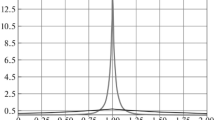Abstract
This paper proves the existence of a stationary distribution for a class of Markov voting models. We assume that alternatives to replace the current status quo arise probabilistically, with the probability distribution at time t+1 having support set equal to the set of alternatives that defeat, according to some voting rule, the current status quo at time t. When preferences are based on Euclidean distance, it is shown that for a wide class of voting rules, a limiting distribution exists. For the special case of majority rule, not only does a limiting distribution always exist, but we obtain bounds for the concentration of the limiting distribution around a centrally located set. The implications are that under Markov voting models, small deviations from the conditions for a core point will still leave the limiting distribution quite concentrated around a generalized median point. Even though the majority relation is totally cyclic in such situations, our results show that such chaos is not probabilistically significant.
Similar content being viewed by others
References
Davis OA, DeGroot MH, Hinich MJ (1972) Social preference orderings and majority rule. Econometrica 40:147–157
Doob JL (1953) Stochastic processes. John Wiley, New York
Ferejohn J, Fiorina M, Packel E (1980) Nonequilibrium solutions for legislative systems. Behav Sci 25:140–148
Kendall MG (1961) A course in the geometry of n dimensions. Hafner, New York
Kramer GH (1977) A dynamical model of political equilibrium. J Econ Theory 16:310–344
Kushner H (1971) Introduction to stochastic control. Holt Rinehart and Winston, New York
McKelvey R, Packel E (1981) Methods of comparison of Markov processes by stochastic dominance. Social Science Working Paper # 395. California Institute of Technology
McKelvey RD (1976) Intransitivities in multidimensional voting models and some implications for agenda control. J Econ Theory 12:472–482
McKelvey RD (1979) General conditions for global intransitivities in formal voting models. Econometrica 47:1085–1112
Packel E (1981) A stochastic solution concept for n-person games. Math Oper Res 6:349–362
Plott CR (1967) A notion of equilibrium and its possibility under majority rule. Am Econ Rev 57:787–806
Royden HL (1963) Real analysis. Macmillan. New York
Schofield N (1980) Generic properties of simple Bergson-Samuelson welfare functions. J Math Econ 7:175–192
Schofield N (1983) Equilibria in simple dynamic games. In: Pattanaik PK, Salles M (eds) Social choice and welfare. North Holland, New York, pp 269–284
Smart DR (1980) Fixed point theorems. Cambridge University Press, Cambridge
Author information
Authors and Affiliations
Additional information
We acknowledge the support of NSF Grants #SOC79-21588, SES-8106215 and SES-8106212.
Rights and permissions
About this article
Cite this article
Ferejohn, J.A., McKelvey, R.D. & Packel, E.W. Limiting distributions for continuous state Markov voting models. Soc Choice Welfare 1, 45–67 (1984). https://doi.org/10.1007/BF00297059
Received:
Accepted:
Issue Date:
DOI: https://doi.org/10.1007/BF00297059




